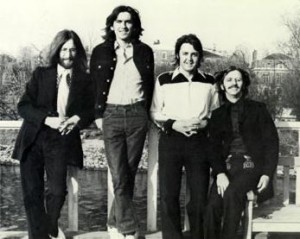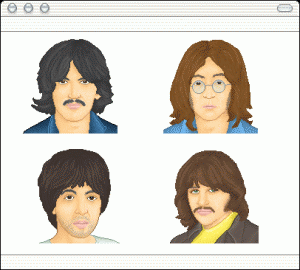We all have a Beatles phase. Can that really be said about any other band? I don’t think so, which is one of the many reasons why they are still the greatest rock band in history, and probably always will be. With the exception of a few psychedelic noodlings here and there, their records still sound fresh and contemporary. Heck, even stodgy university music libraries who don’t normally consider anything written after 1875 to be good enough for their stacks usually have a few Beatles records. In an amazingly short span of time — six years, to be exact — the Beatles turned a music form from a passing fad into an art, and covered more ground than most artists do in a lifetime.

We’re not here to talk about that. We’re here to attempt to answer the age-old question of what the Beatles’ music would’ve sounded like had they not broken up in 1970. And all we’re armed with is approximately 60 albums and 40 years worth of recordings by John, Paul, George and Ringo which have been subject to occasional praise but mostly disappointment and flat-out confusion. I’ll freely admit that this exercise started as a way for me to save space on my iPod and be able to, for example, retain ”Let em In” and ”She’s My Baby” without having the rest of Wings at the Speed of Sound take up 50 additional unnecessary megs. But I also think much of that criticism is unfair, and no one could really have expected any one of the Fab Four to produce anything remotely resembling a Beatles record without the other Fab Three along for the ride. If there exists an alternate universe where the Beatles did not break up in 1970, the songs they wrote and recorded after that are probably different, more innovative, and better than anything they did as solo artists in our universe. But we have to work with what we’re given, so that’s what ”Fixing a Hole” is about.
I’m actually quite surprised there isn’t something like this out there already. A few web searches I did unearthed one article in Reader’s Digest that did put together three such albums out of the early 70s material, but then stopped. But why stop at three? I’m going to go through 13, yes, 13 albums the would-have-been Beatles may have released since 1970. To keep the intros short, I’ll launch right into the first of these albums now, and save going through what I’m going to call the ”ground rules” for the next installment. I’m going to try and put this out once a week, but I may skip a week here and there.

The follow-up to Let It Be, released in late 1970 and containing many songs we still think of as classics, was called Join the Human Race. I’d guess that this would’ve been heralded as a return to excellence after the controversial Let It Be, and possibly compared to The White Album due to the vastly different directions the band members were taking. A rollercoaster of an album created in difficult times:
SIDE ONE (Remember sides? I’m indicating sides for everything up to 1990 — after all, that’s the way albums were once constructed!)
”Instant Karma” — John’s rousing 1970 single which contains the line that became the album’s title. A perfect leadoff track. This one appears to have an actual video!
”Every Night” — you don’t hear this one much anymore, in spite of it having been a single. A simple quasi-blues that Paul probably wrote in less time than it took to sing it, but one of his better tracks on the charming-but-inconsistent McCartney album.
”What Is Life” — While John and Paul were doing homespun-sounding albums in 1970, George was pulling out all the stops for the grandiose All Things Must Pass, a sprawling three-record set that could’ve used some editing and slightly less production but still contains some of his finest moments (before you cry out ”heresy!” be aware that I still consider it a four-star album). This is a single most of us are probably quite familiar with, where George sings his heart out, even over all the layers of production.
”It Don’t Come Easy” — Still probably Ringo’s most-often-heard track. The opening guitar riff is classic, and the whole song rocks. Unfortunately, Ringo didn’t get back to this level for more than 20 years — his two full length records in 1970 consisted mostly of embarrassingly bad country, jazz and early 20th century pop remakes. Stay away.
”Working Class Hero” — A more complex, subtle, and effective protest song than “Give Peace a Chance,” and the centerpiece of Lennon’s real-life Plastic Ono Band. Marianne Faithful’s 1979 cover of this is quite good too.
”Awaiting On You All” — One of George’s many spiritually oriented songs, sort of a gospelly rave-up with a Spector-esque wall of sound, and a personal favorite. Choosing the songs from All Things Must Pass to go on this and the 1971 album was very, very difficult.
”Teddy Boy” — Due to its appearance on the Beatles’ Anthology 3, Paul must have written this acoustic number about a boy and his devotion to his mother in roughly 1968-69 and lobbied for its inclusion on the White Album or Let it Be. It’s a cute song but my guess is that John would have nothing of it.

SIDE TWO
”Mother” — the other centerpiece of Plastic Ono Band which I think is probably the best solo album any Beatle ever put out in terms of the quality of the music, although you have to be in the right mood for it, because… let’s just say it’s not a party album.
”Hot As Sun” — I don’t know why I like this little instrumental from McCartney, but it works for me as a little tension release after Mother, before we get into the intensity of…
”Not Guilty” — Probably my favorite non-album Beatles track, this Harrison rocker was recorded in 1968 but never released in this form until the Anthology 3 collection in the late 90s. George did bring it to light in 1979 on his self-titled LP, but it was given a radically different, lush late 70s jazz/AOR arrangement. Which is OK, but it doesn’t hold a candle to the original one. Does anyone know why this wasn’t included on a late Beatles LP? It’s certainly better than at least two of George’s other late rockers (“I Me Mine” and “Savoy Truffle”).
”Maybe I’m Amazed” — Ah, the classic ballad that even Paul’s harshest critics admit is good. Love the sudden octave jump in the chorus. Love the piano fill that just steps up the scale in half-notes. Love the guitar solo. I don’t care how many times I’ve heard it, it just gets better every time. I’ve never liked the live version from Wings Over America as much — it goes on too long and it’s too slow.
”Remember” — a quirky jam from Plastic Ono Band with some rockin’ piano and a cool sudden ending.
”All Things Must Pass” — the beautiful title track from George’s first solo LP. It may have been written about the Beatles breaking up, which didn’t happen in our alternate reality, but it’s not so specific that George wouldn’t have written in anyway. I originally thought this should close the album, but decided we need something mellower, like…
”Junk” — Like ”Teddy Boy,” an acoustic number that Paul pitched to the rest of the band and got rejected but recorded on his solo debut.
OTHER SONGS FROM THIS PERIOD THAT DIDN’T MAKE IT:
”My Sweet Lord” — one of the ”ground rules” I’m going to go through next week is no songs with Hare Krishna-related lyrics or other direct religious messages (indirect ones are OK). Besides, Paul would’ve caught the fact that it sounded a little too much like the Chiffons’ ”He’s So Fine.”
”Give Peace a Chance/Cold Turkey” — tough to cut, but ultimately I just don’t think the other three would’ve gone for it. The actual peace part is really short, and the “Cold Turkey” part is just a little too out-there.
”Early 1970″ — obviously, without a breakup, Ringo wouldn’t have written it.
Stay tuned for 1971 as we go through the ”ground rules” and then ”Imagine” another Beatles album!





Comments